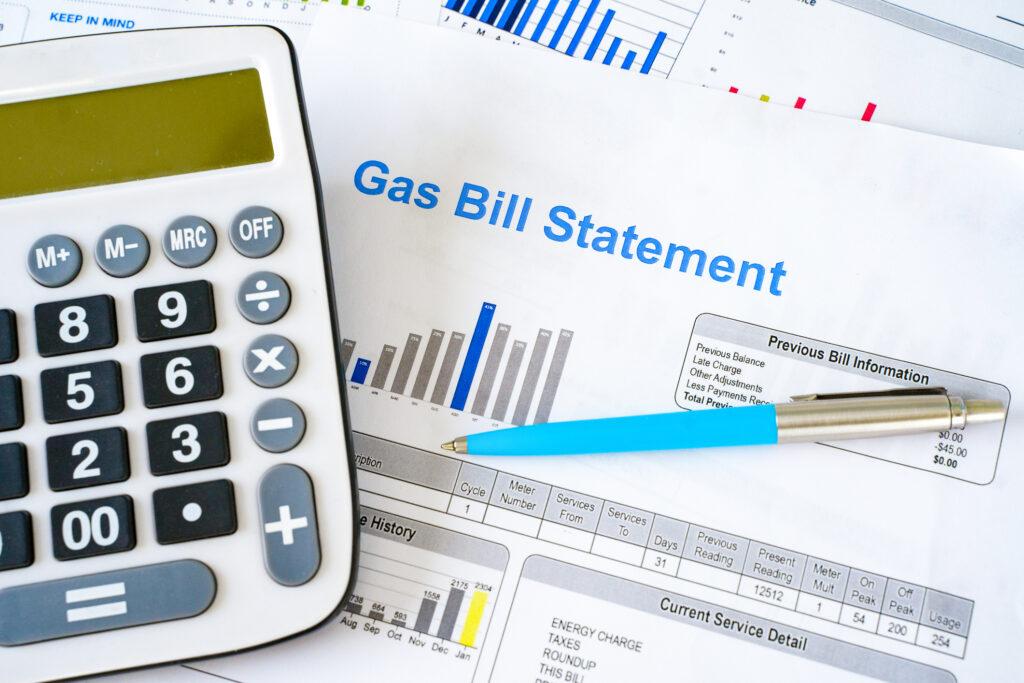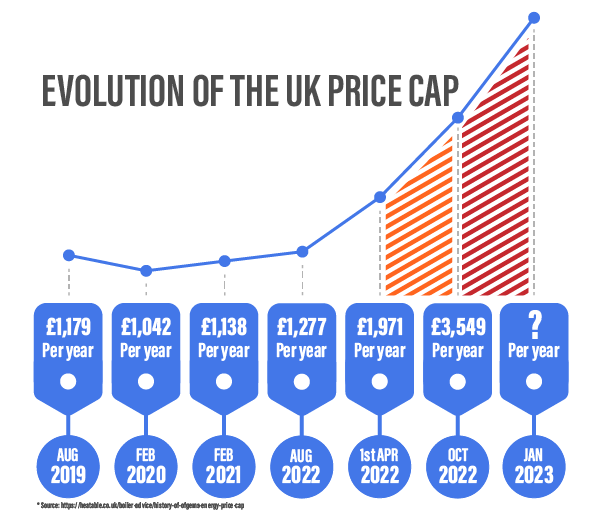Energy Price Cap: UK Energy Prices Are Tripling In October (2022)

In Ofgem's most recent update, they announced a record-breaking energy price cap increase for the third consecutive year. Starting on 1 October 2022, millions of households across the UK will see their energy bills increasing by £1,578 to the total staggering amount of £3,549. That's an 80% increase since Ofgem's last price cap increase in April 2022!
Compared to a year ago, the average UK household energy bill is almost triple what it was in October 2021. This means that most people are going to find the cost of living crisis and energy crisis even harder with devastating effects this autumn.
What is the Energy Price Cap?
The energy price cap, also referred to as the Default Tariff Cap, first came into effect on 1 January 2019. Since then it has limited the rate a supplier can charge for default tariffs. This includes the standing charge and the cost of gas and electricity (per kWh). However, it doesn’t limit your total bill, so the more energy you use, the higher your bill will be.
The previous energy price cap announcement for 1 April 2022, which set a record for the largest increase, now pales in comparison to what we're seeing today. In the table below you can see how significantly prices have been changing.
Price Caps in the UK
| Price Cap Period | 1 October 2021 –
30 March 2022 |
1 April –
30 September 2022 |
1 October –
31 December 2022 |
|---|---|---|---|
| Average Energy Bill* | £1,277 (12% increase) |
£1,971 (54% increase) |
£3,549 (80% increase) |
| Electricity | £0.21 per kWh Daily standing charge: £0.25 |
£0.28 per kWh Daily standing charge: £0.45 |
£0.52 per kWh Daily standing charge: £0.46 |
| Gas | £0.04 per kWh Daily standing charge: £0.26 |
£0.07 per kWh Daily standing charge: £0.27 |
£0.15 per kWh Daily standing charge: £0.28 |
| Source: Ofgem (2022) *based on typical consumption values of 2,900kWh of electricity, 12,000kWh of gas, and 4,200kWh of electricity for Economy 7. Percentage increase compares the price cap period to the previous price cap period. | |||
The dramatic increase recently is the result of a global trend of steadily rising wholesale gas costs, which began to climb as the world began to recover from the Covid pandemic in 2021 and have now been pushed to record highs as Europe scales down its reliance on gas supplies from Russia. And because gas is used to generate a portion of electricity, the price of electricity has seen adjacent rises.
Does The Energy Price Cap Affect Me?
The default energy tariff won't apply to you if you are on a fixed-term energy tariff or have chosen a standard variable green energy tariff that is exempted from the Ofgem cap. But that's only 15% of the UK population. So for the rest of the 85% on default or variable rates, you'll likely be seeing a big cost increase starting this October.
"The price of energy has reached record levels driven by an aggressive economic act by the Russian state. They have slowly and deliberately turned off the gas supplies to Europe causing harm to our households, businesses and wider economy. Ofgem has no choice but to reflect these cost increases in the price cap.
– Jonathan Brearley, CEO of Ofgem
According to figures by the Office for National Statistics (ONS), the latest Ofgem energy price cap means that energy bills could be swallowing up almost half (47%) of the poorest households' budget. This is forcing millions of people to choose between paying their winter heating bills and eating.
While the government support package, introduced in May 2022, is providing some aid right now, it's not enough in light of this higher increase. It would cost an extra £18 billion to provide the same proportion of support for this increase as intended back in May.
There are urges to the incoming Prime Minister and cabinet coming on 5 September to provide an additional and urgent response that matches the scale of the crisis happening right now.
What Can I Do To Reduce My Energy Bills?

It is possible that there may be peace between Russia and Ukraine, that things may change and indeed prices may stabilise or come down, but it is more likely that prices continue to rise.
– Jonathan Brearley, CEO of Ofgem
If there's one upside to rising gas and electricity prices, it's that renewable energy sources- such as solar panels, heat pumps, and biomass boilers- will become relatively cheaper and the number of installations will increase. Also, you can take advantage of the time-sensitive grants and 0% VAT on energy-efficient measures.
If you're looking for ways to save on your heating bill this winter, it's important to start thinking long-term and to start looking for future-proof systems. Making the switch to renewable energy can benefit you and the environment now as you'll avoid expensive and highly polluting fossil fuels.
It can also benefit you in the future since it enables you to become independent of the gas and electricity grid, increase your property value, and will start you on the road to energy self-sufficiency.
Frequently Asked Questions
What is the energy price cap?
The energy price cap limits the cost you can be charged per unit of gas and electricity. It is set by Ofgem and is updated every 3 months. The latest energy price cap has just been announced and it increases costs by 80% since the last update in April 2022.
How does the energy price cap work?
The energy price cap is set by Ofgem, an independent energy regulator, that evaluates the current wholesale price, amongst other economic indicators, to set a limit to how much suppliers can charge for energy. The Ofgem energy price cap has been increased recently and will continue to be updated quarterly.
What is the energy price cap per kWh
The energy price cap per kWh of gas and electricity has increased significantly recently. Since the last energy price cap update in April 2022, it has increased by 80%. Find the latest energy price cap for October 2022 here.
What is the energy price cap standing charge?
For gas and electricity consumers, standing charges are a daily tax that is added to your statement regardless of how much energy you use. Starting in October 2022, the standing charge has increased for both gas and electricity.



